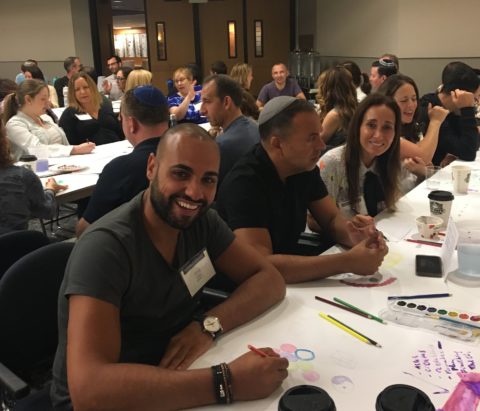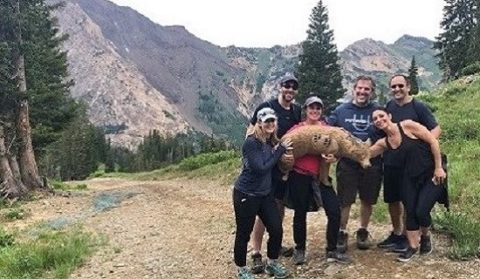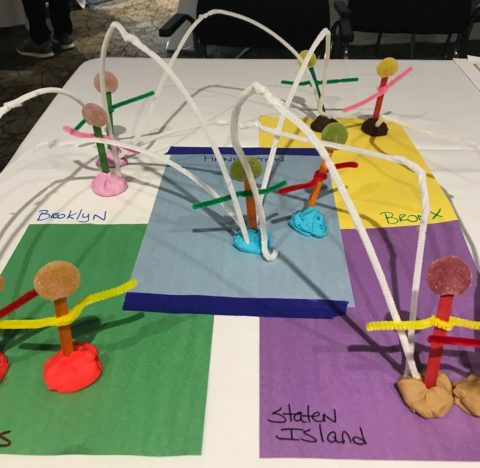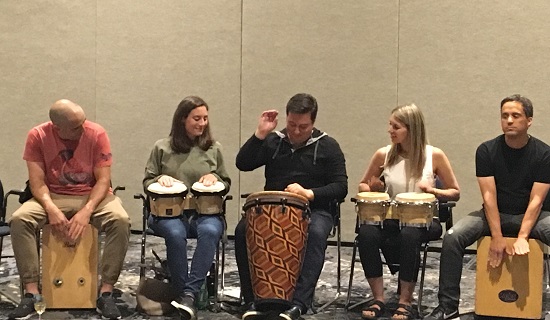This week's Wexner Heritage Summer Institute brought together groups completing their first year of study (Chicago 17, Detroit 17 and Montreal 17) with the groups that will be finishing the program this evening (New York 16, New York RSJ 16 and Philadelphia 16). The Institute, titled "Madregot: Mapping the Journey" sharpened participants' leadership skills and gave them tools to develop their leadership vision through study, reflection, creativity, experimentation, workshopping, networking and more. Here are some of the nuggets they will be taking home with them tomorrow.
Leah Jones, WHP Member (Chicago 17)
In Lisa Kay Solomon’s class in visual thinking—I saw that the value in doodling is far beyond a conference call distraction. Drawing is better than talking because you can't lie in a drawing. So, if you ‘re having problems communicating with someone, then draw the difference you are having. Could be as simple as circles and squares and arrows—doesn’t have to be Renoir. Instead of arguing over definitions, you can see literally what you were each trying to say.
Jodi Miller, WHP Alum (Philadelphia 16) 
Rabbi Uri Topolsky and his stumbling stones—"Don't place a stumbling stone in front of a blind man." Generally, one thinks of stumbling over something as having negative consequences, but he portrayed stumbling as an opportunity to wake up, reevaluate a situation and change course in both path and perspective.
Julie Shugarman, WHP Member (Montreal 17)
Profound beit midrash with Dr. Erica Brown where we were reminded that even Moshe Rabbeinu had a serious burnout moment. The lesson from this outstanding Jewish figure in our shared story is that we cannot do it all alone. This was underlined again today in Rabbi Elka’s beit midrash—even if we have the courage to dance alone, we must do so in a way that encourages others to join and dance with us.
Brandon Prosansky, WHP Member (Chicago 17)
I liked Rae Ringel’s philosophy—we are taught that asking "why" questions is a good thing, but they actually put people on the defensive. So, there are better ways to approach someone when you want information or are curious to know more about them. Instead of saying "why did you do that", say "what motivated you."
Natalie Barth, WHP Alum (New York 16)
This was a great opportunity to bridge Jewish historical learning with leadership skills so we can all move forward in our communal work.
Mike Teplitsky, WHP Member (Chicago 17)
Sometimes successful leadership starts with failure. We discussed how mindful collaboration, self-awareness and resilience drive long-term success. Forgiveness—you can't let interruptions get in the way of our progress. We must forgive in order to move forward.
Tatyana Kybrik, WHP Alum (New York RSJ 16)
Dr. Erica Brown asked us what it means to be Jewish. I feel incredibly connected to Jewish people. I am good with the feeling, but not good enough with the doing. I need to show my kids the doing. I think I would like to start to light Shabbat candles and have Shabbat dinner.
Sheryl Bartos, WHP Alum Spouse (Philadelphia 16)
The most provocative thing was the woman from Detroit who spoke about raising her children both Catholic and Jewish. Is radical and relentless inclusion possible?

Alex Yaroslavsky, WHP Alum (New York RSJ 16)
Aaron Henne's paradigm of the exodus narrative: exile, wandering and redemption—that there are 3 ways to tell your own personal narrative or to look at any arc of experience. It's applicable to coaching or any kind of leadership work too. A helpful universal framework: wandering/uncertainty, finding a solution and then achieving it.


